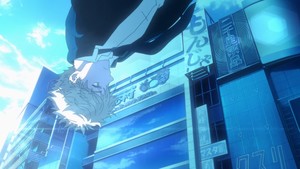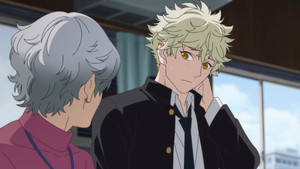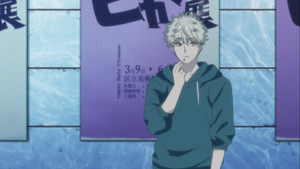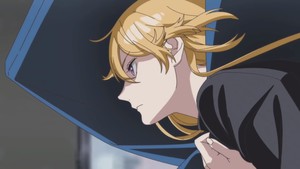The Fall 2021 Preview Guide
The Blue Period.
How would you rate episode 1 of
Blue Period ?
Community score: 4.2
What is this?

Yatora Yaguchi excels in school and is well-liked by his peers, but inside he's a high school boy grappling with emptiness and frustration. That is, until one day when he finds himself fascinated by a painting. The painting's impact drives Yatora to throw himself into the harsh and beautiful world of art.
The Blue Period. adapts Tsubasa Yamaguchi's manga of the same name and streams on Netflix on Saturdays.
How was the first episode?
 Caitlin Moore
Caitlin Moore
Rating:
Blue Period? Is that what the women in all the menstrual product commercials get?
Thank you, thank you, I'll be here all day!
Now that I've gotten that joke out of my system, I can give my real opinion, which is that the first episode of Blue Period is a truly excellent 25 minutes of anime storytelling. Yatora Yaguchi is a typical disaffected teen with piercings and dyed hair, smoking and running around with his delinquent friends at all hours of the night. He doesn't get much satisfaction or pride out of the good grades he works hard for, but also doesn't see much point in putting effort into hobbies that won't help secure a comfortable future. He thinks his childhood friend Yuka is just throwing her life away in the art club.
Then one morning, after a night out drinking and partying with his friends, he notices how different Shibuya looks just before dawn, when the city is still in bed. Something in him awakens, and for the first time, he finds himself driven to capture it for a school assignment and try at something for its own sake, rather than to gain approval. However, his family doesn't have a lot of money to pay for art school, and following his passion will be a rough road.
It's a familiar structure for shonen anime, elevated by a pitch-perfect script and strong visual storytelling. Yatora doesn't have a preternatural talent for art to start producing perfect pieces instantly; his early sketches show promise but are lacking in basic techniques like perspective. In fact, the people around him reject notions like “talent” altogether; the art club member he talks to explains that her ability comes from effort, study, and passion, not some inborn gift that only a few people are granted. Yatora, in turn, discovers not just the joy of finding something he cares about, but the vulnerability that comes from creating from the heart and the connection with others that risk can bring. The writing is full of humanity and humor; the only character making outside of Yatora's internal monologue is the art teacher (but then, that's kind of her job). Most of the dialogue is more subtle, conveying the characters' relationships without most of them having to be explained.
Blue Period's big glaring flaw also lies in the dialogue: more specifically, that between Yatora and his old friend, Yuka. Yuka is a trans girl, or at least some stripe of nonbinary; either way, she doesn't go by the name he insists on calling her anymore. His dialogue with her is loaded with transphobia, saying he's “worried about [her]” because she's dressing like a girl, comparing it to her criticism of him smoking to fit in with his dirtbag friends. It's nasty and if it puts people off the show entirely, I wouldn't blame them.
In some ways, Blue Period reminds me of my favorite movie, Whisper of the Heart, in its recognition of the creation of art both as something deeply personal and a way to connect with others, and the fear and vulnerability in sharing it. I'm already invested in Yatora's journey.
 James Beckett
James BeckettRating:
Watching Blue Period was one of those disappointing experiences that happens when an adaptation fails to live up to the promise of its source material. Here is a really cool story with some interesting characters, and it touches on a subject matter I really dig; the traditional painting arts aren't pursuits that I've seen covered in a whole lot of detail in anime and manga, but it's a match that makes a lot of sense, and I like how Blue Period is mixing the informative sensibilities of a slice-of-life hobby show with the more serious tone and execution of a coming-of-age drama. Stories about wayward youths that discover their passion through a new hobby or creative pastime can be really rewarding when they're done well. The problem is that, as a work of animation, Blue Period just isn't done very well at all.
At first, I was wondering if the show's stripped-down aesthetic was an intentional choice, maybe one meant to highlight the contrast between protagonist Yatora's unfulfilling life and the new perspective he discovers when he joins up with his school's art club. As the episode went on, though, it became much more obvious that Blue Period is simply not a well-made anime. The pacing in the early scenes is all off, especially, with stiff animation and sloppy-looking facial expressions for the characters that look amateurish in almost every scene. There's almost no musical score to be heard in many of these dialogue-heavy scenes, which only makes it easier to spot the awkward moments of dead air in between each of the characters' lines. The direction for these scenes is aimless, and none of the “camera” work does much to hide the flatness of the art.
The show does pick up when Yatora first arrives at the art club, especially when he runs into an old acquaintance of his, Yuka. None of these scenes do much to make Yatora more likeable or compelling, especially since he insists on misgendering and deadnaming Yuka in a way that is deliberate and antagonistic. Yuka is a fascinating character in her own right, seeing as she's one of the few examples I've ever seen of a transgender/nonbinary character whose nonconforming identity is made an explicit part of her character, but isn't used as the butt of a joke. The other art club members are also nice, and I especially appreciate having a teacher in an anime that actually seems to be teaching her students, for once.
That teacher gives some advice that provides a clear direction for Yatora's character, which will hopefully address his own personal flaws and his crappy treatment of Yuka: When people are true to themselves, they can create wonderful works of art. I generally love the idea of watching a teenage scum-bum learn to be a better person through exploring his burgeoning love for painting, and I've heard great things about the Blue Period manga. Unfortunately, while Studio Seven Arcs' has definitely convinced me to give the manga a shot, it has not given me any reason to keep watching the show itself. It just isn't any fun to look at or listen to, which is kind of a death sentence for an anime like this.
 Nicholas Dupree
Nicholas DupreeRating:
Well it took nearly seven years of fans demanding it – and their two biggest anime streaming competitors being conglomerated under an even richer megacorp – but Netflix Jail has finally been abolished. For this season, anyway; with this service there's no telling month-to-month what they'll do with any of their anime properties. But for at least this brief period of time, we're in the era of Netflix Probation, which will hopefully mean Blue Period here doesn't get washed away from memory, because damn is it good.
Stories like this live or die off their characters, and thankfully this first episode gives us a great look into the conflicting, complicated mess inside Yatora's head. He's a teenager caught between a lot of outside forces, all made that much more confusing by his own defensive cynicism, and seeing both the big and subtle ways that internal drama plays out across this episode is really endearing. He has a friend group, but doesn't feel comfortable being vulnerable or honest around them, for fear of being mocked or seeming weird. He does his best in school because he's convinced that's the best option for making a decent living, regardless of whether the “normal” route of academic and professional life is something he actually wants, all compounded by his family's finances making it his only real option. But when he tries just a little to pop out of his shell and experiment with painting outside of making a grade, he finds a kind of feeling he can't get enough of, and against his “better” judgment chooses to keep pursuing it. It's a wonderful little short story on its own, and sucked me in immediately.
The rest of our supporting cast look to be pretty fun too. Their art teacher especially has a really endearing energy to her, easily seeing through Yatora's defensive persona, but gently and earnestly encouraging him to be honest with himself. We don't see as much from the other art school members yet, but they all offer tidbits of interiority that have me really excited to see more of them. Yuka's biting and confrontational, but also observant enough to figure out at a glance that Yatora's only smoking because his friends do, before going back to biting his head off. Mori seems like a typical quiet arts student, but shows a sharp and insightful side when talking about her “talent” and all the hard work it took to achieve it. There are an infinite number of ways to approach art, and having a diverse and interesting cast is key to a show exploring it, so I have high hopes for all of them.
Overall though I just appreciate the way this episode approaches art. It acknowledges the struggles of being an artist, from affording school to the highly uncertain professional prospects, but still insists that the fulfillment of expressing yourself – and sharing it with others – is a worthwhile passion in and of itself. I'd probably be watching this just to communicate to Netflix that yes, please, stream your shows weekly goddammit. But thankfully that task is now a labor of love rather than obligation.
 Richard Eisenbeis
Richard EisenbeisRating:
Coming out of the first episode, the thing I liked most about Blue Period is the title—and all the ways it connects with the story being told. On the most superficial level, the term “Blue Period” alone evokes the imagery of paintings, brushes, and the creation of fine art—which fits perfectly for an anime set in a high school art club.
The title is also an obvious allusion to Pablo Picasso's Blue Period, which refers to a period between 1901 to 1904 when the legendary artist was depressed and painted the unfortunate and the poor in bluish tones. Yaguchi, our protagonist, is similarly depressed, but hasn't realized it by the start of the anime. His life is an endless grind. He spends time with his friends because it is expected of him, not because it's fun. He studies hard for the same reason. His life is devoid of personal purpose and passion. Like so many, he has yet to find the thing that will give him fulfillment—which brings us to the third meaning of the title.
In Japanese, the word commonly used for adolescence is “seishun.” But if we break it down, it is made up of two kanji characters: the “sei” meaning “blue” and the “shun” meaning “spring.” Blue Period is the story of Yaguchi's adolescence—the springtime of his life. It's the tale of how a young man finds the passion he has been subconsciously seeking and his attempts to turn that passion into a way of life.
Of course, Yaguchi is far from the only character dealing with the personal discovery that comes throughout adolescence. While we don't spend too much time with the character, Yuka is in the midst of a different kind of self-discovery. Going by Yuka's dead name, and the way Yaguchi interacts with her, it'd be safe to assume that Yuka was male at birth. However, this has clearly become something much more fluid in high school as we see Yuka wearing both male and female uniforms in the episode. For all the struggle Yaguchi is facing in making art into a career, Yuka is doing that plus dealing with being LGTBQ in conservative Japan. If Yaguchi is living life on hard mode, Yuka is doing it on nightmare difficulty.
So, all in all, the first episode of Blue Period is a fantastic setup for what promises to be some compelling themes and interesting characters. What's not to like?
 Rebecca Silverman
Rebecca SilvermanRating:
Yatora is at a loss and he doesn't even know it. Pressured by his mother to get good grades because they can't afford a private university. Pressured mildly by his friends to hang out with them and watch soccer all night because he's smart enough that they don't think he needs to study to get those grades. Going through the motions for both because that's what he's always done and he's not sure what else he can do, much less that there may be something more out there. It's a position that plenty of people find themselves in, especially in a world where success, often meaning “financial success,” is held more important than personal happiness.
All of that does make this episode very heavy, and while I wouldn't call Blue Period a light series by any means, this is the most difficult part to get through because Yatora is so plainly unhappy with himself and his life and equally oblivious that there's anything he can do about it. Instead he takes out his frustration on his classmate Yuka while pretending to be the person that his mother and his friends think he is or want him to be. That Yuka is either a transgirl or nonbinary makes the whole thing particularly distasteful (Yatora deliberately addresses them by their dead name), but it's also a marker of how unhappy he is, with Yuka being the easiest target for his frustration. (That doesn't excuse it; it simply explains it.) That's why it's fitting that Yuka, along with an upperclassman and the art teacher, are the ones who give him the push he needs towards getting out of the rut his life is in: they all open his eyes to the fact that maybe there's something more out there that he never bothered to see or understand.
If you know anything about the manga this show is based on, you know that that thing is art. Like many people, Yatora believes that art school isn't a viable option for a successful future and career (and like many people he seems to discount “teaching” as either of those things), but after seeing a painting and discussing its techniques with the older girl who created it, Yatora starts to realize that maybe there's more to this art thing than he realized. There's certainly an implication that he's always had a talent and an eye for this sort of thing – when he remarks to his friends that Shibuya in the early morning looks blue, he's just expressing something he's clearly noticed before but never vocalized. Yuka gives him the shove he needs to begin thinking about what he might really want and feel, but it's a combination of people and Yatora himself that really pushes him to act on it.
Despite being a slow episode, there's a lot to think about with this piece. Most of the action is inside Yatora's mind and we aren't always privy to it, but if you've ever had to convince someone that your non-STEM field was valid or that you really did want to make your passion into your career (and here I am!), a lot of this episode will feel familiar upon reflection. Whether it's drawing, dancing, writing, or any other creative pursuit, a lot of work goes into devoting yourself to it. That's not something Yatora has realized yet, but given how hard he's committing himself to being unhappy, once he fully realizes his passion, he's going to shine.
discuss this in the forum (250 posts) |
this article has been modified since it was originally posted; see change history
back to The Fall 2021 Preview Guide
Season Preview Guide homepage / archives